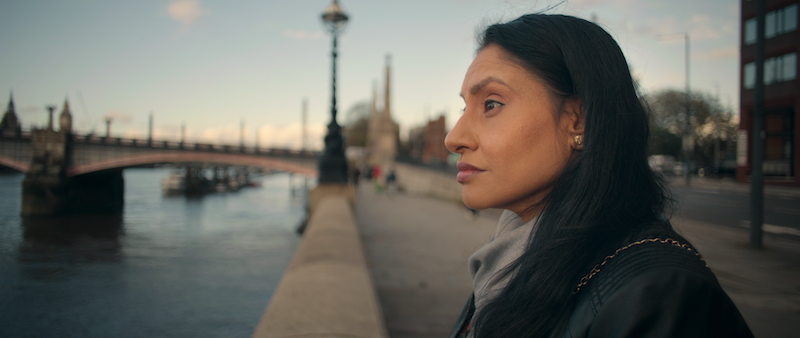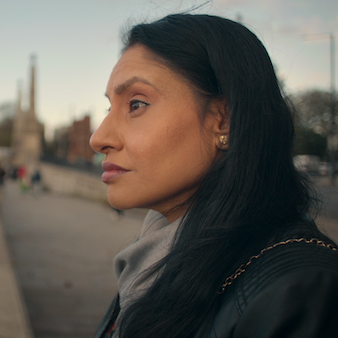‘I was catfished for 10 years: the man i loved wasn’t real, and his true identity destroyed me’
Words by Alice Hall

It was the catfishing nightmare that shocked millions of listeners of the hit podcast Sweet Bobby, now the subject of a new Netflix documentary of the same name. For almost ten years Kirat Assi believed she was in a long-distance relationship with ‘Bobby’ only to discover that she had been the victim of a disturbing fraud. Now she wants to raise awareness of the devastating impact of catfishing which, she tells Grazia, ‘can happen to anybody’.
While Bobby Jandu was a real person, his identity had been stolen by Kirat’s cousin, Simran Bhogal. She posed as Bobby online and manipulated Kirat in an extraordinary web of deceit. Simran invented a complex online network of 60 characters connected to Bobby, some real people whose Facebook profiles had been duplicated, and others totally fictional. These guises were used to trick Kirat into believing Simran’s fraud and the elaborate lies Bobby would weave over the course of their relationship.
The scam started in 2009, when Kirat was approached by ‘Bobby’ on Facebook following the supposed death of his brother JJ – who happened to be Simran’s ex-boyfriend (JJ was, in fact, alive and well). ‘I don’t randomly speak to people online. I’ve never been that person,’ Kirat says. When Bobby contacted her, thanking Kirat for being kind to his brother and helping him through his break up with Simran, Kirat felt on the back foot. ‘I was thinking, “I haven’t even paid my condolences, and he’s approached me.” That’s not right in our culture. I felt a bit ashamed and guilty that I didn’t reach out when I should have.’
Very gradually, Assi and Bobby formed an online friendship, messaging back and forth. ‘He used me as a shoulder to lean on, but I was very careful about what I shared with him. It was all very respectful,’ she says. The friendship continued over many years until Bobby confessed he was in love with Kirat. But that wasn’t all: the declaration of love came after Bobby spun an astonishing story, claiming that he had been shot and was recovering in a New York hospital having been relocated in a witness protection programme.
‘I understood for someone to be in witness protection there had to be some kind of threat to life. Bobby’s from a well-known family and some of the photos and things that I’ve seen online show wealth, which is why he might be targeted,’ Kirat says in the documentary.
‘Bobby continued to use a constant stream of medical emergencies to control kirat’
Kirat eventually agreed to a ‘romantic’ relationship with Bobby, under the impression that he only had six months left to live. ‘I thought he was going to die. You think “what have I got to lose?” I’m just making a man happy. But then he never died.’ Instead, Bobby continued to use a constant stream of medical emergencies to control Kirat.
Throughout their relationship, Bobby told Kirat he couldn’t video call or show his face because of the witness protection program.
‘Video calling wasn’t really a thing back then,’ she says. ‘In witness protection, video calling wasn’t allowed, it was a risk apparently to everyone else in the vicinity. We just stuck to that rule for ages. When he came out of witness protection, he asked me to video call, but he’d never show his face. Eventually I switched mine off, because he wouldn’t show his.’
Then more excuses came; his phone would be broken, or a health issue would flair up. All the while, he began to exert more and more control over Kirat, eventually ruling her whole life. ‘I couldn’t even go to the bathroom without telling him because he’d say, “Where were you? I got scared, what if something happened to me and you weren’t there?”’ He got angry if she went out and spent time with other people.
She was expected to pick up the phone whenever he rang, and to stay on the line to speak ‘consultants’ when he had a medical emergency so she could be there for Bobby when he woke up. ‘Whenever he came round, I’d have to gently talk to him. [The consultants] said I needed to tell them if there were changes in his behaviours, or if he was making noises, because it could be that he’s having seizures in his sleep. I’d be reporting stuff to the consultant constantly – that being Simran,’ she says. ‘It was very uncomfortable. It became very intense because of the health stuff I thought was going on. It was my kindness being taken advantage of,’ she adds.
‘It’s hard for people to understand what it’s like being in that situation. It’s like a drip […] Slowly, you’re controlled to the point where you’re not doing the things you want to do, or that you would do, because you’re trying to avoid an argument, or you’re scared.
‘I tried to block him, but then he’d have a stroke, and his “cousin” would call me and say, “he needs you”. I’d feel guilty I caused it because the consultant told me he shouldn’t have stress. It was a cycle.’
Her mental health started to deteriorate due to the toxic relationship with Bobby. ‘I recognised I wasn’t myself, and the few people I had occasional communication with were saying it to me too,’ she says. ‘I shut myself off. I couldn’t speak. I started to lose weight.’ One time she was going to meet a colleague, which she had to keep a secret from Bobby. ‘I was like, “I can’t leave the house, I’m too scared. What’s going to happen if he finds out?”’
In the end, Kirat’s suspicions were raised when Bobby finally visited London, but still refused to see her. She hired a private investigator who tracked Bobby’s last known address to Brighton and Kirat drove down to confront him. After a painful confrontation with the real Bobby, the truth unravelled. The Bobby she had been communicating with for years was, in fact, her cousin Simran.
The documentary shines a light on Simran’s confession, which came the day after Kirat told her she was going to tell the police about the deception. ‘I can’t comment on how Simran might be feeling [about the documentary],’ Kirat says. ‘She didn’t let on very much after the confession. I just want her to be accountable and own up to exactly what she’s done. I’d like her just to lay it out, so we all know what she’s done and how she’s going to take responsibility for it.’
Kirat won a ‘substantial settlement’ in a civil case against Simran In 2020 for ‘harassment, misuse of private information, and data protection breaches’. However, catfishing is not against the law in the UK and police told Kirat that what happened to her is not a crime.
Does she hope the documentary might finally deliver some kind of justice? ‘I hope the documentary creates awareness about these issues and instigates some kind of change in people’s attitudes and allows other people to speak up,’ she says. ‘I know there’s other victims, some that have come forward, some that haven’t. Everyone’s scared of being ridiculed, but I’ve put myself out there to be ridiculed. I might be stupid, naïve, whatever you want to call me, but she shouldn’t have done what she did. We need to call that kind of behaviour out.’
IMAGE: NETFLIX

